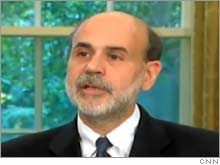 |
| Ben Bernanke, the nominee to succeed Alan Greenspan as Federal Reserve chairman, differs from Greenspan in speaking style more than substance. |
|
|
|
|
|
|
|
NEW YORK (CNN/Money) -
Tuesday could mark the beginning of the end of Greenspanspeak.
That's the day that Federal Reserve Chairman nominee Ben Bernanke appears before the Senate Banking Committee to start what is expected to be a smooth confirmation process.
Bernanke, who has been serving as chairman of the president's Council of Economic Advisers, has pledged that if he's confirmed he'll work to maintain the same policies and strategies of outgoing Fed Chairman Alan Greenspan.
But some Fed watchers say that the public will notice one major difference between the Maestro and the new chairman. They might actually be able to understand what the new guy is thinking.
"The language will clearly be different," said John Silvia, chief economist with Wachovia Securities. "He'll give you a direct answer."
Silvia said that the plainer speaking style could help Bernanke gain influence relatively quickly in Washington, as his arguments will be more clearly laid out for policymakers in Congress or the administration. There were times that Greenspan's comments could be used by both sides of a policy debate to argue their points, Silvia said.
"He'll tackle the issues straight on, here's how I think how we got here, and here's you have to do," said Silvia. "It'll be a real challenge to the politicians."
Silvia and other Fed watchers say that you shouldn't expect explicit announcements from Bernanke or any other Fed member about what the central bank will do at its next meeting. But the markets have become pretty good at figuring out what the Fed will do next, even with Greenspan's sometimes obtuse language.
What some Fed watchers say will be the biggest difference is that Bernanke will explain the thinking behind the Fed action's in a much clearer manner.
"I think Ben's style is a bit more open than Greenspan's," said Lyle Gramley, a former Fed governor and member of the Stanford Washington Research Group. "This is a guy who will be very careful about his choice of words. He'll be cautious, but he won't be as obscure."
Bernanke's language is also seen as being a bit more accessible and vivid than the outgoing chairman's.
In speech in November 2002, he referred to the idea of combining interest rate cuts and tax cuts to spur spending as the equivalent of a "helicopter drop of money."
In a speech in March of this year, talking about the effects of energy price increases, he said, "You may have heard the story of the fellow who, when asked why he was hitting himself on the head with a hammer, replied that he did it because it felt so good when he stopped."
And the day he was nominated to be the Fed chairman, he told reporters, "Economics is a very difficult subject. I've compared it to trying to learn how to repair a car when the engine is running."
That kind of language is in itself a sharp contrast to the words chosen by Greenspan, which could send the average American scrambling to a dictionary.
In February, Greenspan used the "conundrum" to describe the continued low long-term interest rates in the face of the Fed raising short-term rates. It's an arcane term meaning puzzling question or problem that was relatively little used before Greenspan used it. It has become constantly used by writers and economists since then.
"He does have an academic background. He had to make things clear to undergraduate students, even if they were undergraduate students at Princeton," said Tom Schlesinger, executive director Financial Markets Center.
But Schlesinger said that while Bernanke's language might not seem as dense as Greenspan's, that doesn't mean that he won't stray into using complex economic language and arguments to make his points.
"I think some of those comments you cite are isolated examples," he said. "I expect that there will be more of a difference in degree."
One other difference between Greenspanspeak and Bernankespeak may be how far from monetary policy the new chairman is willing to stray in his comments.
"He's not going to be the world's oracle," said Gramley.
Part of that difference will be because he's new in the job, according to Fed watchers, who point out that even Greenspan wasn't commenting on policy issues such as tax cuts, trade or social security when he first took over as chairman in 1987.
That may serve him as a defense on Tuesday, when Democrats critical of administration economic policy look for him to comment on current proposals he was pushing on Capitol Hill only a month ago, before his nomination.
Sen. Charles Schumer said shortly after his nomination was announced that Bernanke assured the New York Democrat that he had previously been speaking to Congress as chairman of Bush's Council of Economic Advisers and that he hoped to avoid such policy debates during his confirmation process and at the Fed.
"He might try to draw a bright line in the hearing - say that he won't be drawn into commenting on issues not directly related to the Fed's responsibilities," said Schlesinger. "We'll have to see how that plays. It is important that the Fed chairman be seen as independent."
_________________________________________
For a look at what economists are expecting from Bernanke on interest rate hikes, click here.
For more on Bernanke's background, click here.
For a look at the differences between Bernanke's and Greenspan's personal investments, click here.
For a special report on the Federal Reserve, click here.

|